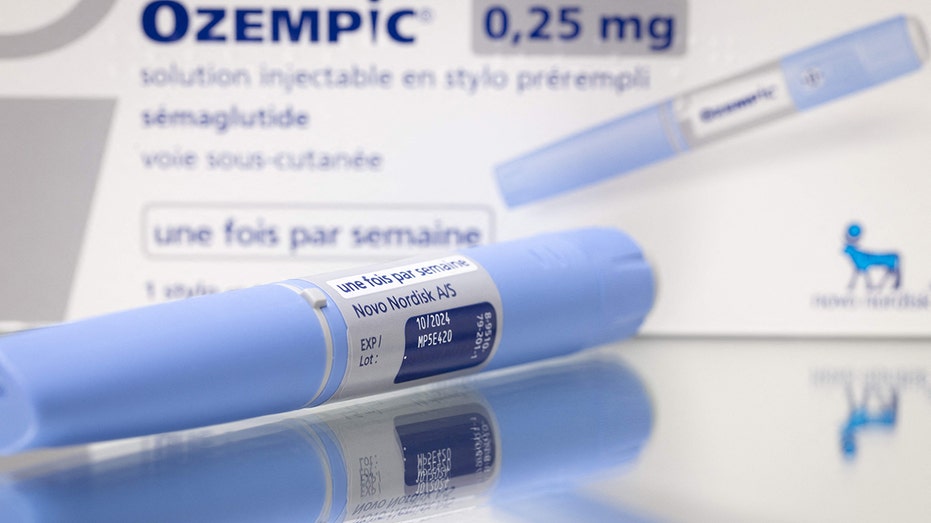FOX News medical contributor Dr. Marc Siegel discusses how prepared hospital E.R.s are to treat kids and the side effects of weight loss drugs on ‘The Big Money Show.’
Ninety-seven percent of shoppers reduced their grocery spending after taking GLP-1 (Glucagon-Like Peptide-1) medication, a recent study shows, and alcohol and processed foods are two of several areas taking a hit.
Data from analytics firm Grocery Doppio’s “State of Digital Grocery Performance Scorecard” found that shoppers who used popular drugs like Ozempic, Wegovy, Mounjaro and Zepbound for weight loss not only purchased fewer food items, but they also swapped out bad foods for healthier alternatives, according to The New York Post.
On the winning end, lean proteins, meal replacements, healthy snack alteratives, whole fruits and vegetables and energy drinks comprised the top five, with lean meat seeing the most significant purchase increase at +27%, the Post reported.
Shoppers are buying less unhealthy foods and opting for healthier alternatives after taking GLP-1 injectables. (iStock)
On the contrary, data indicates shoppers opted less for starchy, sugary and processed goods, with snacks and confectionery makers taking the hardest hit at a -52% decline.
Prepared baked goods (-47%), soda and sugary beverages (-28%), alcoholic beverages (-17%) and processed foods (-13%) also saw measurable declines.
GLP-1 users’ grocery spending declined an overall total of 11%, a change presumably creditable to the drugs’ appetite-suppressing effects and one that could lead major brands to look for ways to appeal to customers focused on weight loss goals.
Food giant Nestlé recently launched a line of products to appeal to GLP-1 users, with nutrient-dense and portion-controlled products, including frozen meals like frozen pastas, sandwich melts and pizzas.
OZEMPIC AND WEGOVY WEIGHT LOSS DRUGS COULD HELP REDUCE ALCOHOL USE DISORDER SYMPTOMS, STUDY SUGGESTS

This photograph taken on February 23, 2023, in Paris, shows the anti-diabetic medication “Ozempic” (semaglutide) made by Danish pharmaceutical company “Novo Nordisk.” (Photo by JOEL SAGET/AFP via Getty Images / Getty Images)
Other companies also homed in on opportunities to cash in on the GLP-1 craze, including Kellogg’s, who recently released a duo of healthier plant-based cereals called “Eat Your Mouth Off” that are richer in protein and have no added sugar.
GLP-1 drugs, or glucagon-like peptide-1 receptor agonists, mimic the actions of the naturally-occurring GLP-1 hormone that controls hunger, manages blood sugar and insulin and helps manage metabolism.
WEGOVY, THE WEIGHT-LOSS MEDICATION, GETS FDA APPROVAL FOR USE AS HEART DISEASE PREVENTION DRUG
RO CEO Zach Reitano explains how his company tracks Ozempic and Wegovy supply on ‘The Claman Countdown.’
Originally intended to treat type 2 diabetes, Novo Nordisk’s Ozempic garnered attention and saw massive amounts of off-label use for its slimming side effect and to treat other endocrinological conditions such as polycystic ovarian syndrome, metabolic syndrome, insulin resistance and prediabetes. Its stronger counterpart, Wegovy, received FDA approval for obesity treatment in 2021.
Eli Lilly’s Mounjaro, a first-in-class GLP-1/GIP (glucose-dependent Insulinotropic polypeptide) receptor agonist drug was also initially used to treat type 2 diabetes, but was FDA approved to be sold for obesity treatment under the name Zepbound in late 2023.
GET FOX BUSINESS ON THE GO BY CLICKING HERE
Fox News medical contributor Dr. Marc Siegel discusses whether weight loss drugs like Ozempic can lower anxiety and depression on ‘Varney & Co.’

